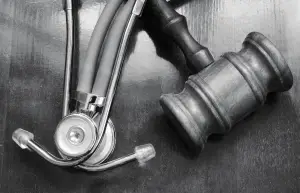 Any case of medical malpractice, sometimes referred to as medical negligence, must comprise the following elements:
Any case of medical malpractice, sometimes referred to as medical negligence, must comprise the following elements:
- Duty
- Dereliction
- Direct causation
- Damages
In This Article
Reading time: 6 minutes
- Duty
- Dereliction
- Direct Causation
- Damages
- Work with a Medical Negligence Lawyer on Your Case
- Let Our Team Review Your Options Today for Free
Duty
Doctors, surgeons, nurses, and other medical professionals owe their patients a duty of care. This duty requires that professionals treat their patients in a manner that is consistent with the generally accepted standards of medical practice. In other words, they must provide the type of treatment and level of treatment as would a reasonably skilled and competent healthcare provider:- With a similar background
- In the same medical situation
- In the same geographic area
For a free legal consultation, call (516) 932-0400
Dereliction
When a medical provider fails to fulfill their obligations to their patients, the behavior is considered a dereliction of duty. When the plaintiff’s attorney proves this violation of duty, they establish medical negligence. Medicare offers the following examples of what they term, “Quality of care complaints”, which for the purposes of discussion here, may also be understood as examples of medical negligence:- Failure to diagnose a condition
- Failure to treat a condition or failure to adapt treatment after the condition changes
- Unnecessary treatment or surgery
- Inappropriate treatment or surgery
- Discharging from a hospital too soon
- Drug errors
Direct Causation
In 2016, The BMJ published an analysis of medical death rates over the course of eight years. The published report reveals that medical error is, tragically, the third-leading cause of death in the United States. When a patient suffers an injury and proves it was the direct result of medical negligence, a medical malpractice claim will be considered. Following medical negligence, the injury sometimes manifests as:- The worsening of a medical condition
- The need for new or further treatment
- Unexpected or unreasonable complications
The Burden of Proof for Causation
In a medical malpractice case, the burden of proof for causation lies with the plaintiff. Although one might think that causation would be simple to prove, this is not often the case. Certain procedures, such as surgery, carry accepted risks. Even with the accepted medical practice, complications occur. It makes proving that the medical provider’s negligence caused the injury a challenging or, at best, fiercely disputed matter. Furthermore, the plaintiff in a medical malpractice case must prove causation by a preponderance of the evidence. They must convince the jury it was more likely than not that the defendant’s actions caused the plaintiff’s injury. As with dereliction, a plaintiff’s lawyer will typically call in a medical expert—or a number of medical experts—to testify that the defendant’s actions caused the patient’s injury.Click to contact our personal injury lawyers today
Damages
Medical malpractice, like other types of personal injury, causes harm in three primary ways:- Financial damages
- Emotional losses
- Physical injuries
Actual Damages
Actual damages refer to economic losses the patient experienced due to their injury. While every case is different, actual damages, also referred to as economic losses, include:- Medical and hospital expenses
- Physical therapy
- Prescription drugs
- Lost income from missing work
- Related expenses and losses
- Miscellaneous costs associated with treatment and care, such as hospital parking
General Damages
General (non-economic) damages cover the harder-to-quantify losses the patient suffers because of their injury. These are intangible losses. They do not have a direct monetary value, but the victim still deserves compensation for them. General damages include:- Mental anguish
- Pain and suffering
- Disfigurement
- Loss of consortium
- Emotional distress
Complete a Free Case Evaluation form now
Work with a Medical Negligence Lawyer on Your Case
Cases involving medical negligence and the medical malpractice lawsuits that result are among the most complex legal matters. Doctors and hospitals tend to be well prepared to protect themselves against these claims, and malpractice insurance providers make countering these claims their life’s work. You do not have to try to navigate this claims process and take on the hospital, a doctor, or another liable party on your own. Working with a New York medical malpractice lawyer will make handling your claim much easier. Your attorney will:- Review the facts of your case and advise you on your options for free
- Represent you based on a contingency fee
- Keep you updated throughout your case
- Identify the liable party or parties in your case
- Manage all communication with the liable parties, insurance companies, and adverse legal teams
- Investigate what happened and gather evidence
- Analyze the evidence to develop a strong claim or lawsuit
- Value your case and negotiate for an appropriate settlement
- Take your case to trial if necessary
Let Our Team Review Your Options Today for Free
If you sustained an injury due to medical negligence, you deserve compensation. The attorneys at Friedman & Simon, L.L.P. will work to establish the four Ds of medical negligence for your case with compelling evidence. We will calculate your damages, file your claim, and negotiate with insurers. If necessary, our team will file a lawsuit on your behalf to recover your damages in civil court. We are advocates for the injured people of New York, and we will work to represent your rights and your interests. Furthermore, because we work on a contingency-fee-basis, you pay us nothing unless and until we win your case. Call Friedman & Simon, L.L.P. today for a free consultation.Call or text (516) 932-0400 or complete a Free Case Evaluation form
